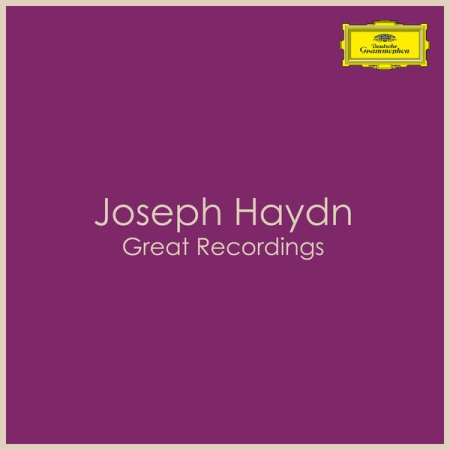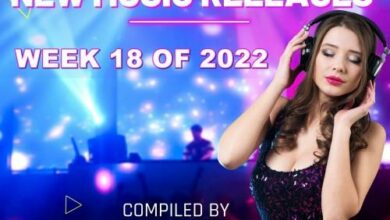VA — Joseph Haydn — Great Recordings (2022)

FLAC (tracks) / MP3 320 kbps | Classical | 19h 47 min | 4.8 / 2.6 GB
Franz Joseph Haydn is the composer who, more than any other, epitomizes the aims and achievements of the Classical era. Perhaps his most important achievement was that he developed and evolved the most influential structural principle in the history of music: his perfection of the set of expectations known as sonata form made an epochal impact. In hundreds of instrumental sonatas, string quartets, and symphonies, Haydn both broke new ground and provided durable models; indeed, he was among the creators of these fundamental genres of classical music. His influence upon later composers is immeasurable; Haydn\’s most illustrious pupil, Beethoven, was the direct beneficiary of the elder master\’s musical imagination, and Haydn\’s shadow lurks within (and somes looms over) the music of composers like Schubert, Mendelssohn, and Brahms. Part and parcel of Haydn\’s formal mastery was his famous sense of humor, his feeling for the unpredictable, elegant twist. In the Symphony No. 94 (\»Surprise\») (1791), the composer tweaks those audience members who typically fall asleep during slow movements with the sudden, completely unexpected intrusion of a fortissimo chord during a passage of quietude. Haydn\’s pictorial sense is much in evidence in works like his epic oratorio The Creation (1796-1798), in which images of the cosmos taking shape are thrillingly, movingly portrayed in tones. By one estimate, Haydn produced some 340 hours of music, more than Bach or Handel, Mozart or Beethoven. Few of them lack some unexpected detail or clever solution to a formal problem. Haydn was prolific not just because he was a tireless worker with an inexhaustible musical imagination, but also because of the circumstances of his musical career: he was the last prominent beneficiary of the system of noble patronage that had nourished European musical composition since the Renaissance. Born in the small Austrian village of Rohrau, he became a choirboy at St. Stephen\’s cathedral in Vienna when he was eight. After his voice broke and he was turned out of the choir, he eked out a precarious living as a teenage freelance musician in Vienna. His fortunes began to turn in the late 1750s as members of Vienna\’s noble families became aware of his music, and on May 1, 1761, he went to work for the Esterhazy family. He remained in their employ for the next 30 years, writing many of his instrumental compositions and operas for performance at their vast summer palace, Esterhaza. Musical creativity may often, it is true, meet a tragic end, but Haydn lived long enough to reap the rewards of his own imagination and toil. The Esterhazys curtailed their musical activities in 1790, but by that Haydn was known all over Europe and widely considered the greatest living composer. (He himself deferred to Mozart in that regard, and the friendly competition between the two composers deepened the music of both.) Two trips to London during the 1790s resulted in two sets of six symphonies each (among them the \»Surprise\» symphony) that remain centerpieces of the orchestral repertoire. Haydn\’s final masterpieces included powerful choral works: the Creation and Seasons oratorios and a group of six masses. Haydn stopped composing in 1803, after which he prefaced his correspondence with a little musical quotation (from one of his part-songs) bearing the text \»Gone is all my strength; I am old and weak.\» He died in Vienna on May 31, 1809.
01 Josef Greindl — No.38b Rez. \»Sie bleibt allein, und leitet uns\» (Recording 1952)
02 Elfride Trotschel — No.21 Rez.: \»Seht, wie zum Haselbusche\» (Recording 1952)
03 Cornelius Hauptmann — 11. Flammis orci ne succendar
04 Walther Ludwig — No.35 Rez.: \»Abgesponnen ist der Flachs\» (Recording 1952)
05 Elfride Trotschel — No.33 Rez.: \»So wie er naht\» (Recording 1952)
06 Josef Greindl — No.3 Rez.: \»Vom Widder strahlet jetzt\» (Recording 1952)
07 Eugen Jochum — Sanctus
08 Walther Ludwig — No.5 Rez.: \»Der Landman hat sein Werk vollbracht\» (Recording 1952)
09 Josef Greindl — No.12a Rez.: \»Nun regt und bewegt\» (Recording 1952)
10 Walther Ludwig — No.12b Rez.: \»Die Mittagsonne\» (Recording 1952)
11 Walther Ludwig — No.19b Rez.: \»Den reichen Vorrat\» (Recording 1952)
12 Elfride Trotschel — No.27 Rez.: \»Am Rebenstocke\» (Recording 1952)
13 Walther Ludwig — No.25 Rez.: \»Hier treibt ein dichter Kreis\» (Recording 1952)
14 Josef Greindl — No.37 Rez.: \»Vom durren Osten dringt\» (Recording 1952)
15 Theobald Schrems — Gloria
16 Josef Greindl — No.23 Rez.: \»Nun zt das entblosste Feld\» (Recording 1952)
17 Elfride Trotschel — No.7 Rez.: \»Erhort ist unser Flehn\» (Recording 1952)
18 Theobald Schrems — Sanctus
19 Elfride Trotschel — No.30 Kavatine: \»Licht und Leben sind geschwachet\» (Recording 1952)
20 Walther Ludwig — No.31 Rez.: \»Gefesselt steht der breite See\» (Recording 1952)
21 Emerson String Quartet — 10. Il Terremoto (Presto e con tutta la forza)
22 Patricia Rozario — 13a.Quando corpus morietur
23 Theobald Schrems — Kyrie
24 English Chamber Orchestra — 4. Finale (Presto)
25 Elfride Trotschel — No.19a Einleituez.: \»Was durch seine Blute\» (Recording 1952)
26 Rafael Kubelik — Sanctus
27 Marga Hoffgen — Dona nobis pacem
28 English Chamber Orchestra — 3. Menuet al Roverso
29 Elfride Trotschel — No.29b Rez.: \»Nun senket sich\» (Recording 1952)
30 Cornelius Hauptmann — 5. Pro peccatis suae gentis
31 The English Concert — 3. Quis est homo, qui non fleret
32 RIAS Orchestre Symphonique de Berlin — No.29a Einleitung (Recording 1952)
33 Marga Hoffgen — Agnus Dei
34 Marga Hoffgen — Gloria In Excelsis Deo
35 Elfride Trotschel — No.16 Rez.: \»O seht!\» (Recording 1952)
36 Anthony rolfe Johnson — 12. Fac me cruce custodiri
37 The English Concert — 7. Eja mater, fons amoris
38 Sylvia McNair — Sanctus
39 Elfride Trotschel — No.34 Lied mit Chor: \»Knurre, schnurre, knurre\» (Recording 1952)
40 Patricia Rozario — 13b. Paradisi gloria / Amen
41 English Chamber Orchestra — 3. Menuet. Allegretto
42 English Chamber Orchestra — 4. Finale. Allegro
43 Ivo Pogorelich — III. Finale. Allegro assai
44 London Philharmonic Orchestra — IV. Finale (Vivace)
45 Theobald Schrems — Agnus Dei
46 Marga Hoffgen — Laudamus Te
47 Josef Greindl — No.24 Arie: \»Seht auf die breiten Wiesen hin!\» (Recording 1952)
48 Theobald Schrems — Credo
49 Mstislav Rostropovich — 3. Presto
50 London Philharmonic Orchestra — IV. Finale (Vivace)
51 Elfride Trotschel — No.10 Arie/Rez.: \»Der munt\’re Hirt\» (Live)
52 Mstislav Rostropovich — 2. Scherzo (Allegro ma non troppo)
53 English Chamber Orchestra — 4. Finale (Presto)
54 Marga Hoffgen — Kyrie Eleison
55 Emerson String Quartet — III. Minuetto (Allegretto)
56 RIAS Orchestre Symphonique de Berlin — No.2 Chor: \»Komm, holder Lenz!\» (Recording 1952)
57 London Philharmonic Orchestra — IV. Finale (Allegro di molto)
58 Emerson String Quartet — 6. Intermezzo (Largo — Cantabile)
59 Eugen Jochum — Quoniam
60 Ivo Pogorelich — III. Finale (Presto)
61 Walther Ludwig — No.32 Arie: \»Hier steht der Wand\’rer nun\» (Recording 1952)
62 Eugen Jochum — Cum Sancto Spiriti
63 Maria Stader — Kyrie Eleison
64 Mstislav Rostropovich — 2. Adagio, ma non troppo
65 Marga Hoffgen — Christe Eleison
66 English Chamber Orchestra — 3. Menuet (Allegretto)
67 London Philharmonic Orchestra — III. Menuetto (Allegretto)
68 RIAS Orchestre Symphonique de Berlin — No.26 Chor des Landvolks und der Jager: \»Hort, hort\» (Recording 1952)
69 Elfride Trotschel — No.36 Lied mit Chor: \»Ein Madchen, das auf Ehre hielt\» (Recording 1952)
70 Mstislav Rostropovich — 3. Vivace assai
71 Emerson String Quartet — II. Moderato
72 London Philharmonic Orchestra — III. Menuetto (Allegro)
73 The Chamber Orchestra of Europe — 3. Menuetto (Allegro)
74 Josef Greindl — No.4 Arie: \»Schon eilet…\» (Recording 1952)
75 London Philharmonic Orchestra — IV. Finale (Vivace)
76 Emerson String Quartet — Mozart: Movement for String Quartet in A, K.464a
77 Josef Greindl — No.38a \»Erblicke hier, betorter Mensch\» (Recording 1952)
78 Elfride Trotschel — No.14 Rez.: \»Willkommen jetzt\» (Recording 1952)
79 Eugen Jochum — Credo in unum Deum
80 English Chamber Orchestra — 2. Allegro di molto
81 The Chamber Orchestra of Europe — 4. Finale (Vivace)
82 Marga Hoffgen — Gratias
83 London Philharmonic Orchestra — IV. Finale (Vivace)
84 Mstislav Rostropovich — 1. Allegro moderato
85 Walther Ludwig — No.13 Kavatine: \»Dem Druck erlieget\» (Recording 1952)
86 London Philharmonic Orchestra — IV. Finale (Presto ma non troppo)
87 English Chamber Orchestra — 4. Finale. Presto e scherzando
88 RIAS Orchestre Symphonique de Berlin — No.28 Chor: \»Juchhe! Juchhe!\» (Recording 1952)
89 Mstislav Rostropovich — 2. Lebhaft, doch nicht zu rasch
90 Walther Ludwig — No.9 Einleituez.: \»In grauen Schleier\» (Recording 1952)
91 Alexander Cameron — III. Menuetto
92 Emerson String Quartet — III. Allegretto
93 Elfride Trotschel — No.18 Terzett und chor: \»Die dustren Wolken\» (Recording 1952)
94 RIAS Orchestre Symphonique de Berlin — No.17 Chor: \»Ach, das Ungewitter\» (Recording 1952)
95 London Philharmonic Orchestra — IV. Finale (Presto)
96 London Philharmonic Orchestra — III. Menuet (Allegro molto)
97 English Chamber Orchestra — 3. Menuet (Allegretto)
98 English Chamber Orchestra — 4. Finale (Presto assai)
99 Elfride Trotschel — No.20 Terzett mit Chor: \»So lohnet die Natur\» (Recording 1952)
100 Mstislav Rostropovich — 2. Andantino piu tosto allegretto
101 Elfride Trotschel — No.11 Terzett und Chor: \»Sie st herauf\» (Recording 1952)
102 Elfride Trotschel — No.1 Einleituez.: \»Seht wie der strenge Winter…\» (Recording 1952)
103 Elfride Trotschel — No.6 Terzett und Chor: \»Sei nun gnadig…\» (Recording 1952)
104 Elfride Trotschel — No.8a Freudenlied: \»O wie lieblich ist…\» (Recording 1952)
105 Elfride Trotschel — No.8b Chor: \»Ewiger, machr, gur Gott\» (Recording 1952)
106 Elfride Trotschel — No.15 Arie: \»Welche Labung\» (Recording 1952)
107 Elfride Trotschel — No.22 Duett: \»Ihr schonen aus der Stadt\» (Recording 1952)
108 Elfride Trotschel — No.39 Terzett und Doppelchor: \»Dann bricht der grosse Morgen an\» (Recording 1952)
109 Eugen Jochum — Domine Deus
110 Eugen Jochum — Qui Tollis
111 Eugen Jochum — Et incarnatus est
112 Eugen Jochum — Crucifixus
113 Eugen Jochum — Benedictus
114 Rafael Kubelik — Kyrie
115 Rafael Kubelik — Credo
116 Rafael Kubelik — Benedictus
117 Rafael Kubelik — Agnus Dei
118 Theobald Schrems — Benedictus
119 English Chamber Orchestra — 1. Allegro con brio
120 English Chamber Orchestra — 2. Menuetto (Allegretto) — Canone in Diapason
121 English Chamber Orchestra — 3. Adagio
122 English Chamber Orchestra — 1. Allegro assai
123 English Chamber Orchestra — 2. Adagio
124 English Chamber Orchestra — 4. Finale (Presto — Adagio)
125 English Chamber Orchestra — 1. Vivace
126 English Chamber Orchestra — 2. Poco adagio
127 English Chamber Orchestra — 1. (Allegro)
128 English Chamber Orchestra — 2. Un poco adagio
129 English Chamber Orchestra — 1. Allegro
130 English Chamber Orchestra — 2. Adagio
131 English Chamber Orchestra — 1. Adagio
132 English Chamber Orchestra — 3. Menuet
133 Sylvia McNair — Kyrie
134 Sylvia McNair — Benedictus
135 Sylvia McNair — Agnus Dei
136 Emerson String Quartet — 1. Introduzione (Maestoso ed Adagio)
137 Emerson String Quartet — 2. Sonata I (Largo)
138 Emerson String Quartet — 3. Sonata II (Grave e Cantabile)
139 Emerson String Quartet — 4. Sonata III (Grave)
140 Emerson String Quartet — 5. Sonata IV (Largo)
141 Emerson String Quartet — 7. Sonata V (Adagio)
142 Emerson String Quartet — 8. Sonata VI (Lento)
143 Emerson String Quartet — 9. Sonata VII (Largo)
144 Emerson String Quartet — 1. Allegro vivace assai
145 Emerson String Quartet — 2. Allegretto
146 Emerson String Quartet — 3. Andante cantabile
147 Emerson String Quartet — 4. Molto allegro
148 Emerson String Quartet — I. Allegro moderato
149 Emerson String Quartet — II. Andante
150 Emerson String Quartet — IV. Allegro ma non troppo — Piu allegro
151 Emerson String Quartet — 1. Allegro ma non troppo
152 Emerson String Quartet — 2. Andante con moto
153 Emerson String Quartet — 3. Allegretto
154 Emerson String Quartet — 4. Allegro vivace
155 Emerson String Quartet — I. Allegro vivace assai
156 Emerson String Quartet — III. Adagio
157 Emerson String Quartet — IV. Allegro assai
158 Emerson String Quartet — 1. Allegro
159 Emerson String Quartet — 2. Menuetto
160 Emerson String Quartet — 4. Allegro non troppo
161 Emerson String Quartet — II. Andante cantabile
162 Emerson String Quartet — 4. Allegro molto
163 Anthony rolfe Johnson — 1. Stabat Mater Dolorosa
164 Catherine Robbin — 2. O quam tristis et afflicta
165 Patricia Rozario — 4. Quis non posset contristari
166 Anthony rolfe Johnson — 6. Vidit suum dulcem natum
167 Patricia Rozario — 8. Sancta mater istud agas
168 Catherine Robbin — 9. Fac me vere tecum flere
169 Patricia Rozario — 10. Virgo viium praeclara
170 Ivo Pogorelich — I. Allegro moderato
171 Ivo Pogorelich — I. Moderato
172 Mstislav Rostropovich — 1. Andante — Presto
173 Mstislav Rostropovich — 3. Rondo (Allegretto)
174 Mstislav Rostropovich — 4. Allegro moderato
175 Mstislav Rostropovich — 1. Allegro
176 Mstislav Rostropovich — 3. Langsam, mit inr Empfindung
177 Mstislav Rostropovich — 4. Mit Feuer
178 Mstislav Rostropovich — 1. Allegro molto moderato
179 Mstislav Rostropovich — 2. Scherzo (Allegro vivo)
180 Mstislav Rostropovich — 3. Adagio
181 Mstislav Rostropovich — 4. Allegro molto
182 The Chamber Orchestra of Europe — 1. Adagio — Allegro assai
183 The Chamber Orchestra of Europe — 2. Largo cantabile
184 The Chamber Orchestra of Europe — 4. Finale (Presto ma non troppo)
185 The Chamber Orchestra of Europe — 1. Adagio — Presto
186 The Chamber Orchestra of Europe — 2. Andante
187 The Chamber Orchestra of Europe — 3. Menuet (Allegretto) — Trio
188 London Philharmonic Orchestra — I. Adagio — Allegro assai
189 London Philharmonic Orchestra — II. Largo cantabile
190 London Philharmonic Orchestra — I. Adagio — Vivace assai
191 London Philharmonic Orchestra — II. Andante
192 London Philharmonic Orchestra — I. Adagio — Allegro con spirito
193 London Philharmonic Orchestra — III. Menuet — Trio
194 London Philharmonic Orchestra — IV. Finale (Allegro con spirito)
195 London Philharmonic Orchestra — I. Allegro moderato
196 Alexander Cameron — II. Andante
197 London Philharmonic Orchestra — I. Adagio — vivace assai
198 London Philharmonic Orchestra — II. Adagio
199 London Philharmonic Orchestra — III. Menuetto (Allegretto)
200 London Philharmonic Orchestra — I. Adagio — Allegro
201 London Philharmonic Orchestra — II. Andante
202 London Philharmonic Orchestra — III. Menuet (Allegro)
203 London Philharmonic Orchestra — IV. Finale (Spiritoso)
204 London Philharmonic Orchestra — I. Adagio — Allegro
205 London Philharmonic Orchestra — II. Andante
206 London Philharmonic Orchestra — III. Menuetto (Allegretto)
207 London Philharmonic Orchestra — I. Adagio — Vivace
208 London Philharmonic Orchestra — II. Adagio ma non troppo
209 London Philharmonic Orchestra — IV. Finale (Presto assai)
210 London Philharmonic Orchestra — I. Adagio — Allegro
211 London Philharmonic Orchestra — II. Adagio
212 London Philharmonic Orchestra — III. Menuetto (Allegro)
213 London Philharmonic Orchestra — IV. Finale (Presto)
214 London Philharmonic Orchestra — I. Adagio — Allegro
215 London Philharmonic Orchestra — II. Allegretto
216 London Philharmonic Orchestra — III. Menuet (Moderato)
217 London Philharmonic Orchestra — I. Adagio — Presto
218 London Philharmonic Orchestra — II. Andante
219 London Philharmonic Orchestra — III. Menuet (Allegretto) — Trio
220 London Philharmonic Orchestra — I. Largo — Vivace
221 London Philharmonic Orchestra — II. Adagio
222 London Philharmonic Orchestra — III. Menuetto (Allegro)
223 London Philharmonic Orchestra — IV. Finale. Presto
224 Berliner Philharmoniker — I. Adagio — Allegro
225 Berliner Philharmoniker — II. Largo



